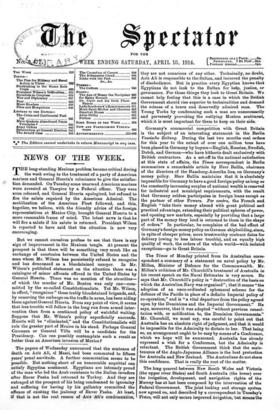Germany's commercial competition with Great Britain is the subject of
an interesting statement in the Berlin Vossische Zeitung. During the last two months coal orders for this year to the extent of over one million tons have been placed in Germany by buyers—English, Russian, Swedish, Dutch, and German—who have hitherto dealt exclusively with British contractors. As a set-off to the national satisfaction at this state of affairs, the Times correspondent in Berlin summarizes a remarkable article by Herr Ballin, chairman of the directors of the Hamburg.Amerika line, on Germany's money policy. Herr BalIM maintains that it is absolutely impossible for Germany to have a good foreign policy as long as the constantly increasing surplus of national wealth is reserved for industrial and municipal requirements, with the result that Germany seldom participates in foreign loans except as the partner of other Powers. Per contra, the French and English "take their money abroad with great political and practical advantage, extending their political spheres of power, and opening new markets, especially by providing that a large part of the money they lend is returned to them in the shape of orders." In particular, he complains of the bad effect of Germany's foreign money policy on German shipbuilding, since, in spite of cheaper prices, more trustworthy contract dates for delivery (owing to lees labour trouble), and an equally high quality of work, the orders of the whole world—with isolated exceptions—go to Great Britain.










































